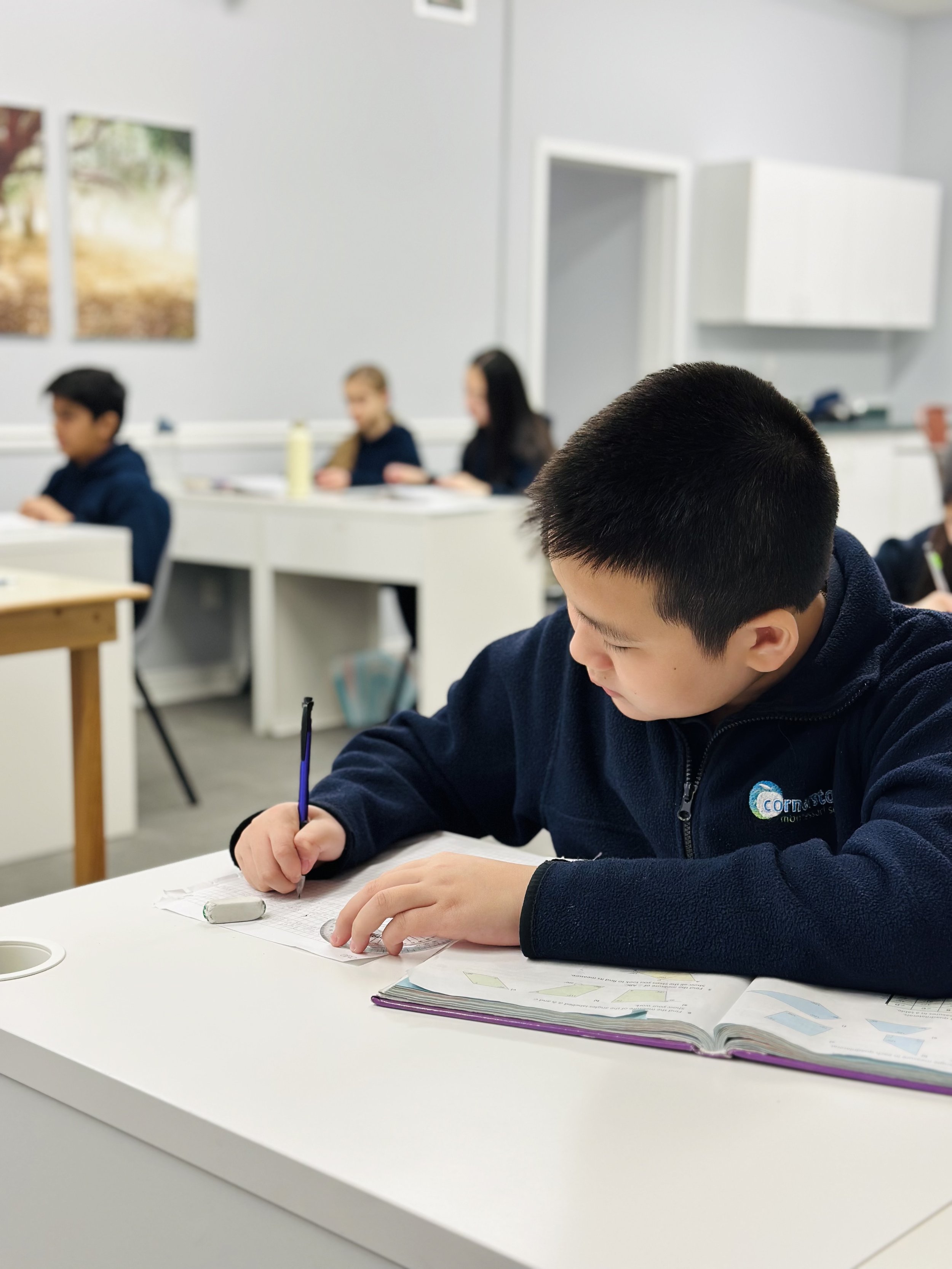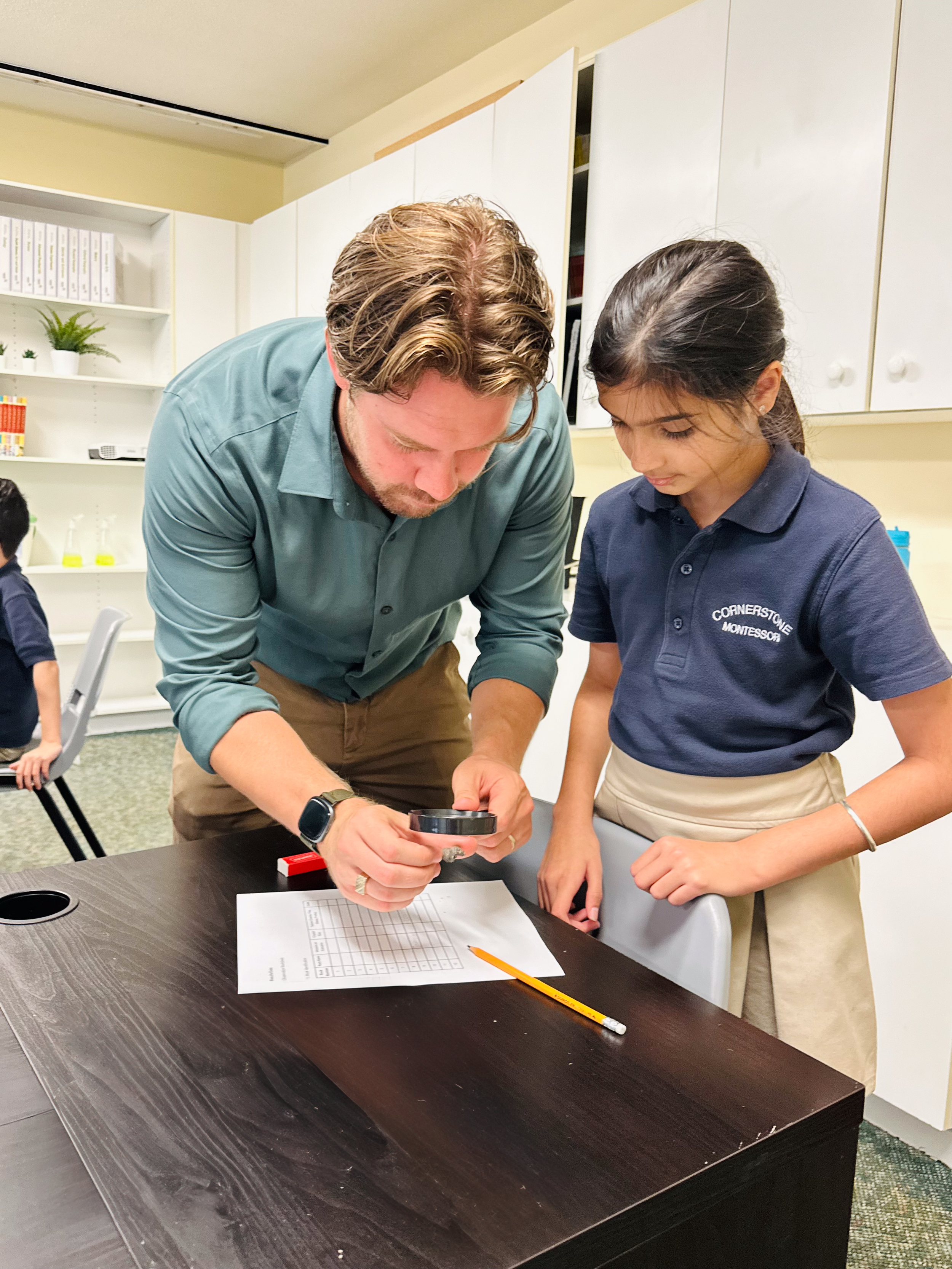
Intermediate
Rooted in Montessori principles and enriched with modern academic practices, the Intermediate Program at Cornerstone Montessori School offers a purposeful bridge between the hands-on learning of the early years and the growing structure and responsibility required for high school.
Students are challenged to think critically, work independently, and explore their interests deeply—all within a supportive and engaging classroom environment.
Enriched Curriculum
The Intermediate Program blends independent work periods with structured whole-class instruction, helping students develop essential academic and organizational skills. Class sizes remain small (maximum 18 students per teacher), allowing for individualized attention and differentiated instruction across all subject areas.
Technology is thoughtfully integrated into the daily curriculum, and lessons are supported by field trips, collaborative projects, and hands-on activities designed to bring learning to life.
English Language Arts
In the intermediate grades, students continue to refine their reading, writing, speaking, and listening skills through a range of engaging activities. Literature circles, novel studies, persuasive writing, research essays, and grammar workshops all form part of a comprehensive Language Arts curriculum.
Students are encouraged to think analytically about texts and to express themselves clearly in writing. Each year, they complete a variety of written pieces, including personal narratives, descriptive essays, opinion pieces, and creative stories. Vocabulary development and grammar instruction are emphasized, with lessons integrated into real writing tasks.
Current events are woven into weekly Language Arts lessons, helping students stay informed about the world while developing critical thinking skills. Through news articles, class discussions, and short written responses, students learn how to summarize key points, identify bias, and form their own opinions respectfully and thoughtfully.
Students also participate in debate practice, where they learn to research both sides of an issue, organize their ideas, and present persuasive arguments. These activities help build confidence in public speaking, as well as the ability to listen and respond thoughtfully during discussions.
Research projects become more complex, with students learning how to gather information from reliable sources, paraphrase effectively, and properly cite their work. Presentations, both individual and group, help students build confidence in public speaking and digital storytelling.
Mathematics
Mathematics instruction in the intermediate years emphasizes problem-solving, conceptual understanding, and real-world application. Students build fluency with core operations—including long division, multi-digit multiplication, and order of operations—and apply their knowledge to word problems, measurement, geometry, and data analysis.
Digital tools are used to support learning in areas like graphing and financial literacy. Students also engage in thematic math units that cover time, budgeting, statistics, and algebraic thinking. Math fact fluency continues to be reinforced through homework and online practice platforms, with teachers tracking accuracy and progress.
Science and Social Studies
In the intermediate years, students explore Social Studies and Science through rich, interdisciplinary units that emphasize inquiry, research, and hands-on learning. These subjects are taught both independently and through cross-curricular connections with Language Arts, Art, and Technology. Students are encouraged to think critically, ask meaningful questions, and develop a deep understanding of how the world works—past, present, and future.
Science
Some of the science topics explored in the intermediate grades include:
Forces and Motion
The Human Body
Electricity and Circuits
Chemical Changes and Compounds
Evolution, Organisms, and Natural Selection
Rock Cycles
Environmental Impact of Waste
Basic Chemistry and Physics Concept
Students regularly conduct experiments, build models, and engage in STEM challenges to deepen their understanding of scientific processes and real-world applications. They learn to ask testable questions, collect and interpret data, and communicate their findings using a variety of tools and methods.
Some units also integrate creative disciplines such as music history, helping students draw meaningful connections between science, the humanities, and the arts. The emphasis is not simply on memorizing facts, but on developing scientific curiosity, collaboration, and the ability to apply knowledge in thoughtful, relevant ways.
Social Studies
Social Studies in the intermediate program invites students to explore civilizations, cultures, and systems of power throughout history. Topics may include:
Medieval Europe
Ancient Civilizations (e.g., Mesopotamia, Ancient Japan and China, Ancient Rome and Greece)
World War II
Government Systems (Canadian and Global)
NGOs, Poverty, and Social Status
South Africa: Apartheid and Cultural History
Early Explorers
The Fur Trade and Gold Rush
Inventions That Changed the World
Myths and Legends (Southern African, Canadian First Nations, Ancient Greek and Roman)
The Rise and Fall of Empires
Neanderthals and Early Humans
Plate Tectonics and the Theory of Pangea
Students engage in these topics through a variety of learning methods including digital research, primary and secondary sources, and interactive project-based work. Their findings are often presented through essays, visual displays, creative presentations, or dramatic reenactments—fostering a strong sense of ownership, perspective, and historical empathy.
Technology
Technology plays an integral role in the Cornerstone intermediate program. Each student is provided with their own MacBook, which is used daily across all core subjects: Mathematics, Language Arts, Social Studies, Science, Current Events, French, Health, and occasionally Art.
Students become proficient in a range of digital tools and platforms including Google Classroom, Canva, Google Slides, Google Sheets, Duolingo, Khan Academy, and typing programs. They regularly complete research-based assignments and are taught how to gather and cite credible information for essays, presentations, and projects. With access to their Google accounts at home, students can continue their learning beyond the classroom, receive timely feedback from teachers, and develop strong digital literacy skills.

Daily homework is assigned to reinforce concepts learned in class and to promote consistent study habits. For students who demonstrate a high level of academic achievement, we offer enrichment opportunities that go beyond the standard curriculum, encouraging deeper thinking and creative exploration.




